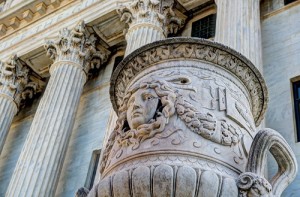Week in Review: Court Hears Oral Arguments in Six Cases

The U.S. Supreme Court started its November sitting this week. The justices heard oral arguments in six cases.
In addition to an important case involving Article III standing, the Court also considered several criminal law issues. Below is a brief review of the cases before the Court.
Foster v. Chatman: The case concerns how juries are selected in criminal trials. In Batson v. Kentucky, 476 U.S. 79 (1986), the U.S. Supreme Court held that the Equal Protection Clause of the U.S. Constitution prohibited the use of peremptory challenges to exclude prospective jurors based on their race and established a three-part test to determine whether discrimination has occurred. The issue before the Court this time is how the test should be applied.
Spokeo, Inc. v. Robins: The justices took up an interesting case regarding standing. The specific question the Court must address is: Whether Congress may confer Article III standing upon a plaintiff who suffers no concrete harm, and who therefore could not otherwise invoke the jurisdiction of a federal court, by authorizing a private right of action based on a bare violation of a federal statute. While the case involves the Fair Credit Reporting Act (FCRA), the Court’s decision could impact lawsuits under a number of other federal statutes.
Lockhart v. United States: The criminal law case involves how to interpret a federal sentencing statute, with the defendant and the government each relying on a different canon of statutory construction. The specific issue before the Court is: Whether the mandatory minimum sentence of 18 U.S.C. § 2252(b)(2) is triggered by a prior conviction under a state law relating to “aggravated sexual abuse” or “sexual abuse,” even though the conviction did not “involv[e] a minor or ward,” an issue that divides the federal courts of appeals.
Torres v. Lynch: Non-citizens are subject to deportation if they are convicted of a crime under state law that is functionally similar to certain federal crimes. In this case, the justices must determine whether a state offense constitutes an aggravated felony under 8 U.S.C. § 1101(a)(43), on the ground that the state offense is “described in” a specified federal statute, where the federal statute includes an interstate commerce element that the state offense lacks.
Shapiro v. McManus: By statute, certain types of cases, including legal challenges to the constitutionality of redistricting plans, must be heard by three-judge court. The issue before the Court is whether a single-judge district court may determine that a complaint covered by 28 U.S.C. § 2284 is insubstantial, and that three judges therefore are not required, not because it concludes that the complaint is wholly frivolous, but because it concludes that the complaint fails to state a claim under Federal Rule of Civil Procedure 12(b)(6).
Bruce v. Samuels: Under the Prison Litigation Reform Act, prisoners proceeding in forma pauperis must each month pay 20 percent of their existing income towards a federal case or appeal’s filing fee, until satisfying the entire filing fee. The question in this case is whether, when a prisoner files more than one case or appeal in the federal courts in forma pauperis, the statute caps the monthly exaction of filing fees at 20 percent of the prisoner’s monthly income regardless of the number of cases or appeals for which he owes filing fees.
Previous Articles
SCOTUS Decision in Bowe v. United States Is First of the 2026 Term
by DONALD SCARINCI on February 5, 2026
In Bowe v. United States, 607 U.S. ___ (2026), the U.S. Supreme Court held that Title 28 U.S.C. § ...
SCOTUS Rules State Can’t Immunize Parties from Federal Civil Liability
by DONALD SCARINCI on January 29, 2026
In John Doe v. Dynamic Physical Therapy, LLC, 607 U.S. ____ (2025) the U.S. Supreme Court held that...
Supreme Court to Address Racial Discrimination in Jury Selection
by DONALD SCARINCI onWhile the U.S. Supreme Court has concluded oral arguments for the year, it continues to add cases t...
The Amendments
-
Amendment1
- Establishment ClauseFree Exercise Clause
- Freedom of Speech
- Freedoms of Press
- Freedom of Assembly, and Petitition
-
Amendment2
- The Right to Bear Arms
-
Amendment4
- Unreasonable Searches and Seizures
-
Amendment5
- Due Process
- Eminent Domain
- Rights of Criminal Defendants
Preamble to the Bill of Rights
Congress of the United States begun and held at the City of New-York, on Wednesday the fourth of March, one thousand seven hundred and eighty nine.
THE Conventions of a number of the States, having at the time of their adopting the Constitution, expressed a desire, in order to prevent misconstruction or abuse of its powers, that further declaratory and restrictive clauses should be added: And as extending the ground of public confidence in the Government, will best ensure the beneficent ends of its institution.





